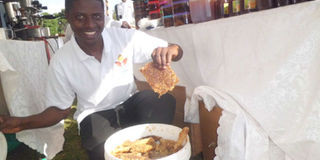Bees give Obanyo honey and money

Simon Obanyo
It is 2.30pm as the youth from various places in the country gather at Makerere University Agricultural Research Institute, Kabanyolo (MUARIK) for the launch of the fifth CURAD-Swiss contact agribusiness innovations challenge and to show case of their agricultural products they are marketing.
It is an initiative where a number of development partners such as CURAD, Swiss Contact and Stanbic Bank have signed a collective MOU in trying to help impart skills in youths across the country by engaging in agriculture as a business.
Stanbic Bank has come in to provide a revolving fund for the youth to be able to participate in agribusiness initiatives by participating in business incubations for skill gaining in a particular agriculture product.
Simon Obanyo one of the youth Mbarara District who is busy offloading different packages of honey for display. He stands out among the rest of the youth as one can see the passion and zeal he has in handling his apiary products ranging from honey and bee keeping inputs such as protective wear for bee smokers.
How he started
He is happy to share his journey in apiary farming. Obanyo, 29 explains that his passion for bee keeping started when he was in Primary Four in 2001. He used to harvest honey in the wild. One day he saw a man in the village making local beehives.
The farmer taught him how to weave local beehives. By the time he was in Primary Six he had four beehives and had his first company, Banyo Honey Ltd registered.
He harvested about five litres or more but the business collapsed when he failed to balance pursuing his studies and apiary farming.
When he eventually joined Senior One, he started bee farming afresh and increased the hives to 15. This became his key source of income with which he could pay part of his school fees from the proceeds.
Later, the entire family joined him in the business. In 2014, after completing his studies he became a full-time apiary farmer. He got an opportunity to travel to Canada for training in bee keeping and he has been collaborating with development partners such as Swiss Contact who support youth in agribusiness skills training.
Now he owns a total of 274 beehives; 176 are in his home village in Bushenyi and 98 in Ibanda districts.
Best practices
He notes that it is important to set up beehives in different places in order for them to access the natural flowers and this way one is able to harvest good quality honey at an increased quantity.
Harvesting
There are two seasons in harvesting honey, June – September season which is a major season and January – March.
During the major season he is able to harvest between 27 and 34 litres in 20 litre Jerrycans and between 18 to 23 jerrycans in the minor season.
Marketing
Apart from beekeeping, Obanyo is engaged in marketing bee inputs such as protective wear namely suits and gloves, bee smokers and gumboots.
He has marketing outlets in the districts of Kampala, Wakiso, Rubirizi, Ibanda and Mbarara.
Packaging
The honey is packaged in various sizes namely 50ml, 100ml, 120ml, 200ml, 1 litre, 5litres and more depending on customer need. The cost is between Shs1,000 and Shs25,000. In the various outlets he is employing youth as sales persons paying each a salary of Shs200,000 and Shs300, 000. There are people who hawk his honey products and they are paid commission of Shs10,000 and Shs20,000 per day depending on the amount sold.
Training
The team is able to train other youth groups in bee keeping. This is done in Mbarara and the village farm. They charge a fee of Shs100,000 for a trainee to acquire knowledge in bee keeping.
Farmers also hire the team to go and establish for them bee farms. He is not yet married but he is paying school fees for his siblings who are in advanced secondary education and at the University.
Other products
Apart from these products, he processes therapy jells for tumor cell using bee venom.
He also processes bee propolis for treating wounds and other injuries and bee wax for processing candles as well as lip bums.
Obanyo’s family comprise of four other siblings who are working with him in managing the farm as well as the apiary business.
Benefits
His engagement in bee farming and processing as a business has supported the entire family.
He has managed to put up a decent house for his parents and for himself and now his target is to invest in acquiring more land.
He notes that bee keeping does not require a lot of land because if someone has a quarter acre or one acre of land, he or she is good to go.
However the family is engaged in growing other crops particularly coffee on commercial basis.
At most in a year he is able to earn between Shs30m – Shs50m from proceeds obtained from apiary farming but other agricultural produce may add up to Shs50m or more.
Obanyo recently acquired Shs50m from the bank which money he used to purchase honey from other farmers.
Once he has sold proceeds from his farm he goes out to purchase honey from other apiary farmers across the country to keep the business running.
This is how the initiative has become a collective family initiative.
He has also been in position to collaborate with development partners such as Swiss Contact and Heifer International who are helping in skilling the youth in agribusiness initiatives.




